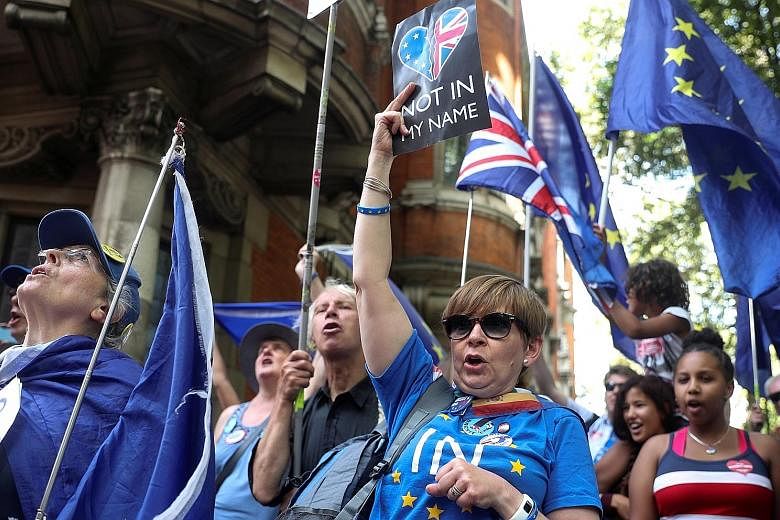LONDON • Political opposition to British Prime Minister Boris Johnson's move to suspend Parliament crystallised yesterday amid protests, legal action and a petition to block the move that has garnered more than a million signatures.
Mr Johnson's manoeuvre gives his political opponents even less time to prevent a chaotic no-deal Brexit before the Oct 31 withdrawal deadline. The decision outraged critics and is serving as a unifying force for the disparate opposition, who have confirmed they will press on with measures to block leaving the European Union without a deal despite Mr Johnson's actions.
"We will seek to try and put through the appropriate legislation in this constrained timetable that the government has now put before us," said Mr Barry Gardiner, the opposition Labour Party's spokesman for international trade.
Labour Party finance chief John McDonnell said yesterday that they are still open to calling a vote of no confidence in Mr Johnson's government and would welcome the chance of a general election.
Thousands packed College Green outside Parliament on Wednesday evening, waving EU flags and placards to express their anger. Smaller rallies took place in other towns and cities while 25 bishops from the Church of England released an open letter about their worries over the "economic shocks" of a no-deal Brexit on the poor and other vulnerable people.
A petition on a government website demanding Parliament not be suspended received more than 1.4 million signatures - guaranteeing it will be considered for debate.
Legal challenges also loom. A hearing took place in Scotland yesterday over a bid to determine the legality of Mr Johnson's decision to suspend Parliament ahead of a possible no-deal Brexit.
House of Commons leader Jacob Rees-Mogg dismissed the fury and described Mr Johnson's move as constitutional and proper.
"I think the outrage is phoney and it is created by people who don't want us to leave the European Union and are trying very hard to overturn the referendum result and don't want the benefits of leaving the European Union," he told the BBC yesterday. "This is completely constitutional and proper," he said. "There is going to be a lot of time to debate before Oct 31."
Mr Johnson's move has prompted ruptures across the political spectrum, including among members of his Conservative Party. Scottish Conservative leader Ruth Davidson, who has differed with Mr Johnson in the past, resigned yesterday. Though the popular leader cited family reasons, the timing of such a decision following Mr Johnson's seismic move suggested that she disagreed with his tactics.
Others in the party are more obviously concerned. Senior Conservative lawmaker Ken Clarke was among those describing the suspension of Parliament as "absurd".
"He has just given in to the fanatic element of his followers and decided to go hell for leather," Mr Clarke said. "I hope it will bring together the sensible majority of Parliament who will find some alternative."
The outpouring of fury follows three years of tensions after the 2016 referendum on EU membership, in which 52 per cent of voters favoured withdrawing.
The EU is adamant it will not renegotiate the agreement struck with former premier Theresa May. Without such a deal, Britain faces a chaotic Brexit that economists warn would disrupt trade by imposing tariffs and Customs checks between Britain and the bloc, send the value of the pound plummeting, and plunge Britain into recession.
Mrs May resigned in defeat after failing three times to secure Parliament's backing for her divorce deal.
Mr Johnson has told European officials that it will not be possible to agree to a deal on Britain's departure from the bloc without the removal of controversial language on a "backstop" aimed at avoiding the return of a border between EU member Ireland and Britain's Northern Ireland. He said at the close of the Group of Seven summit in Biarritz, France, on Monday, that he was "marginally more optimistic" of progress.
Meeting in Helsinki, European foreign ministers watched the drama unfold, but insisted they would stand by Ireland on the backstop issue.

While most ministers avoided comment on the suspension of the British Parliament, saying it was an internal matter, Austria's Foreign Minister Alexander Schallenberg, when asked if a hard Brexit was more likely because of the move, said: "I fear so, yes."
"The ball is in the UK's court... We have done whatever is possible to ensure an orderly exit of Britain," he said.
SEE OPINION












